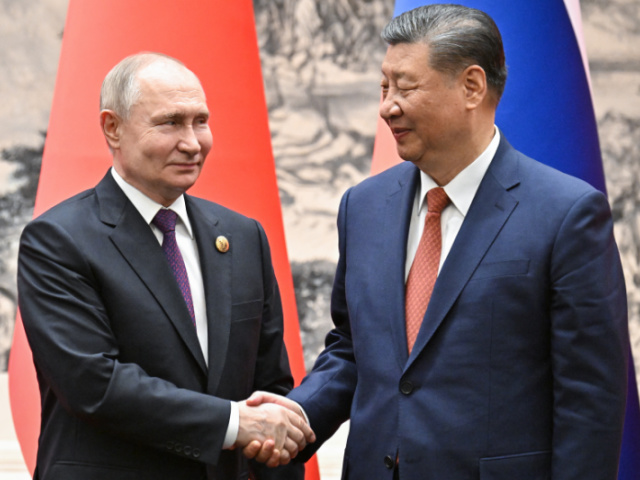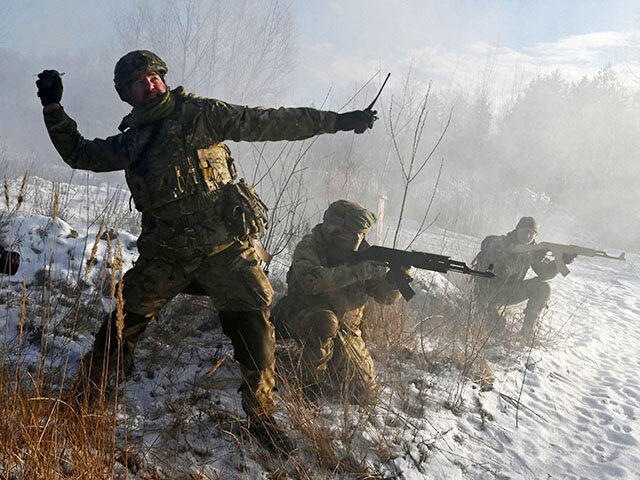Russian Foreign Minister Sergey Lavrov claimed on Thursday that the Chinese Communist Party is interested in offering “reliable security guarantees” to Ukraine in exchange for ending the two-year-old full-scale Russian invasion of the neighboring country.
Lavrov claimed that Beijing was interested in “security guarantees for everyone” involved in the Ukraine conflict, which reached the level of full-scale war in 2022 but had been an ongoing military conflict fueled by Russia since at least 2014, when strongman Vladimir Putin invaded and colonized Ukraine’s Crimean Peninsula. The top diplomat made his comments while in Beijing, where he is joining Putin for a two-day visit featuring extensive face-to-face time with genocidal dictator Xi Jinping.

In this pool photograph distributed by the Russian state agency Sputnik, Russia’s President Vladimir Putin and China’s President Xi Jinping shake hands during a signing ceremony following their talks in Beijing on May 16, 2024. (Photo by SERGEI BOBYLYOV/POOL/AFP via Getty)
Putin spent much of Thursday in private conversations with Xi and his top officials that reportedly addressed the Ukraine war in addition to other key topics, such as bilateral trade and cooperation to oppose American interests at the United Nations and other global venues. The two published a joint statement following their talks that stated Moscow and Beijing agreed that to find “a sustainable settlement of the Ukrainian crisis, it is necessary to eliminate its root causes.” Putin also reportedly touted China’s “peace plan” for Ukraine, a template published by the Chinese Communist Party in February 2023 with vague suggestions to both parties, including a call to “calm down as soon as possible.”
Lavrov claimed in an interview on Thursday that the Russian government had “regularly discussed” Ukraine with China.
“This subject is being regularly discussed with our Chinese friends who have an absolutely correct position, essentially, to sort out root causes and collectively remove them,” the Russian news agency Tass quoted Lavrov as saying, “ensuring reliable security guarantees for everyone. The West is not ready for this.”
Tass did not report that Lavrov elaborated on what kind of “security guarantees” China was willing to offer. The Chinese government has also provided no details on what the conversations with the Russian delegation on Thursday addressed regarding the Ukraine war, outside of claiming that Moscow supports the Chinese “peace plan.”
Putin made China his first stop since being inaugurated into his fifth term as “president” of Russia in early May, following a sham “election” in which the Russian regime blocked legitimate opposition parties and intimidated rivals into silence. Putin noted in his remarks that Xi also made Moscow his first foreign travel engagement after the Communist Party coronated him to yet another term at the helm of the country in March 2023, which he called part of a “positive and commendable tradition.” On Friday, Putin is expected to travel to the northern Chinese city of Harbin for visits to industrial locations and more trade talks.
China is Russia’s closest ally on the world stage and currently supports the Ukraine invasion. Chinese Defense Minister Dong Jun asserted in February that his country had “supported you on the Ukrainian issue despite the fact that the US and the EU continue to put pressure on the Chinese side,” vowing the Communist Party would not “change or abandon [its] established policy.”
China has traditionally maintained friendly relations with Ukraine, however, and has kept communication open with the administration of President Volodymyr Zelensky throughout the war. Ukraine is a member of China’s Belt and Road Initiative (BRI) – Beijing’s global program to ensnare poor countries in predatory loans – and Zelensky has personally called for “Chinese businesses” to rebuild Ukraine after the war. Another sign indicating that China has tried to maintain a neutral facade in the war were comments by Putin in September 2022 in which he openly admitted Chinese officials had “concerns” with the ongoing military conflict.
China’s playing both sides of the Ukraine invasion led Kremlin spokesman Dmitry Peskov to assert in April that China has “impressive potential for mediation” in the conflict. Neither Russia nor Ukraine has shown any enthusiasm, however, regarding China’s most heavily promoted contribution to the situation: its February 2023 “peace plan” urging “calm” and an end to “bloc rivalry.” Ukraine and Russia both responded coolly to a delegation of Chinese diplomats who have engaged in two European tours fostering dialogue, largely ignoring the envoys.
“Security guarantees,” as Lavrov mentioned, is a heavily charged term for Ukrainians, as the United States and other Western powers committed to giving Ukraine “security guarantees” to prevent a Russian invasion in the 1990s in exchange for Ukraine dissolving its nuclear weapons program. As part of the former Soviet Union, Ukraine was one of the world’s most heavily armed nuclear states when it achieved independence.
“By 1996, Ukraine had returned all of its nuclear warheads to Russia in exchange for economic aid and security assurances, and in December 1994, Ukraine became a non-nuclear weapon state-party to the 1968 nuclear Nonproliferation Treaty (NPT),” the Arms Control Association recalls in its historical analysis of the denuclearization of Ukraine.
“Ukraine committed to full disarmament, including strategic weapons, in exchange for economic support and security assurances from the United States and Russia,” the organization details. Notably, Ukraine’s nuclear weapons all went to Russia.
Zelensky often demands that America fulfill its “security guarantees” when urging it to provide more money and weapons to the Ukrainian cause. Zelensky has also regularly demanded that Ukraine receive membership in the North Atlantic Treaty Organization (NATO), which would legally require America, and all other members, to treat an invasion of Ukraine as if it were an invasion of the United States homeland and respond accordingly.
Zelensky most recently demanded respect for the “security guarantees” offered to Ukraine in a meeting with Secretary of State Antony Blinken, who traveled to Kyiv this week for a surprise visit.
Follow Frances Martel on Facebook and Twitter.

COMMENTS
Please let us know if you're having issues with commenting.